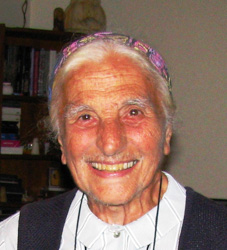
Sister Rose Dominic entered Maryknoll on September 6, 1948 from Our Lady of Mt. Carmel parish, Buffalo, New York. She came with a B.A. in Education from NY State at Albany and an MS in Social Work from the University of Buffalo. She made her First Profession of Vows on March 7, 1951 at Maryknoll, NY and her Final Vows on March 7, 1954 in Bolivia.
Sister Rose Dominic’s first assignment was to Hawaii in 1951 working in Catholic Charities at Nuuanu, Honolulu. In 1953 Sister Rose Dominic was assigned to the Bolivia/Peru and did language study for one year at Cochabamba, Bolivia. In 1954 Sister Rose Dominic was sent to Peru and did social work in Lima. There she met Sister Rose Timothy Galvin in 1962 while working with poor Peruvian families. Both social workers were known as “the Roses” and in 1966 they moved to Caja de Agua in Lima where they were in charge of the administration of the program of social promotion directed to the Lima area until 1971. Caja de Agua was a “model” government housing project to resettle a whole community that had lived for years on the banks of the Rimac River in terrible slum-like conditions. The homes built of cinder block did have water and electricity. With their neighbors, the “Roses” lived on the “margins”. The Sisters visited sectors of the city where prostitutues would be on the street waiting for customers and the Sisters talked to the prostitutes, letting them know of their concern for them as women.
Creatividad y Cambio (Creativity & Change) was a Center started by Sisters Rose Dominic and Rose Timothy, dedicated to promote the human rights of women. The Center produced, published and distributed pamphlets with information on women’s issues and carried out campaigns against sexual exploitation of women. With the collaboration of two other women, they began a center called Movimiento El Pozo (The Well Movement) to work specifically with women involved in prostitution, and where these women could meet to talk about their problems and where they could find solidarity with other prostitutes.
As a women’s rights activist, Sister Rose Dominic estimated that thousands of Latin American women worked in Europe’s sex industry and the traffic had spread to Asia. Unlike voluntary migration, trafficking of persons involved violence, threats of violence or other forms of coercion. She addressed the underlying causes of women’s poverty and inequality and believed that if women were respected and their labor valued the same as men’s, women would not have to resort to prostitution for survival. The need was to eradicate the concept of women as sexual objects and promote women’s personhood.
Sister Rose Dominic also supervised the field work of students from the National and Catholic Social Service schools where she taught. The archbishop asked her, with Sister Janet McConnell, to promote Family and Community Services within the Archdiocesan welfare program of Caritas of Lima.
As a Peruvian citizen, Sister Rose Dominic attended the International Conference on Women in Beijing, sharing with women of over 180 countries the common concerns of women around the world and ways to help one another.
